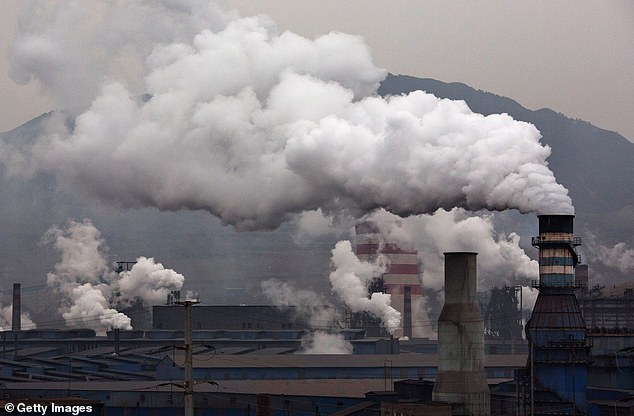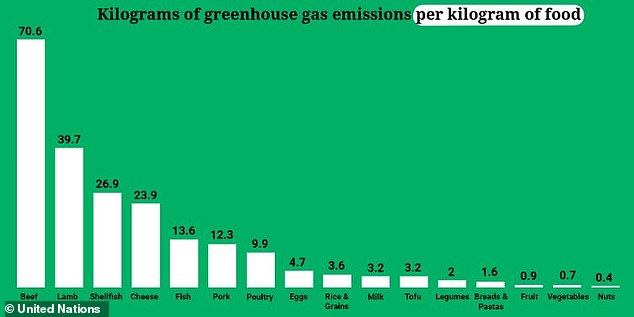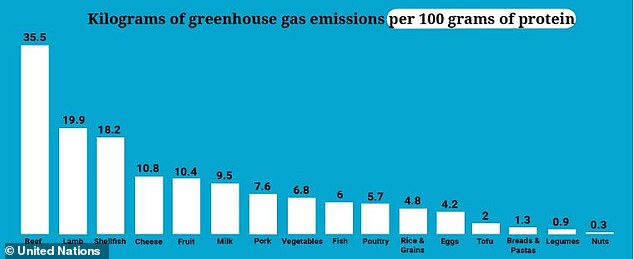United Nations set to call on Americans to stop eating meat in an effort ‘to tackle climate change’ – despite only making up 1.4% of global emissions
>
A UN agency is expected to call on Western countries, including the United States, to significantly reduce meat consumption to combat climate change.
The United Nations Food and Agriculture Organization (FAO) announced that it will publish a road map that includes global nutritional recommendations during the COP28 climate summit in Dubai, which begins Thursday and lasts for two weeks.
In a first-of-its-kind document, the agency will call on countries that “excessively consume meat” to reduce consumption to reduce greenhouse gas emissions.
It will also issue guidelines on how farmers can adapt to “erratic weather” and reduce emissions from food waste and fertilisers.
However, the U.S. agricultural industry accounts for only 1.4 percent of global emissions and 10 percent of total greenhouse gas emissions.
Critics of US green policies often point out that countries like China have produced more greenhouse gases than all the other developed countries in the world combined.
China is the world’s second-biggest polluter even when emissions dating back to 1850 are taken into account, new figures show, refuting Beijing’s insistence that the West is “historically responsible” for the climate crisis.

Meat consumption in the United States has been largely responsible for the climate crisis, but data suggests that reducing it will not have a significant impact
The UN guidance is a recommendation and is not legally binding, just like the Food and Drug Administration (FDA) dietary guidelines for Americans, which are issued every five years.
“We already have solutions to address climate change, and many of these solutions, whether agroforestry, soil restoration, sustainable livestock or fisheries management, have multiple benefits,” said Kaveh Zahedi, Director of the FAO Office of Climate Change. They can also support the sustainable use of biodiversity, as well as help achieve food security – multiple benefits from the same solutions provided only by agriculture and food systems.
2021 study from Nature Food Magazine It found that the global food system generates 18 billion tons of carbon dioxide every year – a third of all emissions worldwide. Livestock is responsible for about 14.5 percent of global emissions.
The United Nations and other agencies have long called for eliminating red meat and switching to plant-based diets to prevent climate change.
In 2021, the US will have to significantly reduce its meat consumption to meet President Biden’s benchmark of cutting greenhouse gas emissions by at least 50 percent by 2030, food and climate experts told DailyMail.com.
“To avoid the most catastrophic climate change scenarios,” Brent Kim, a Maryland-based expert at the Johns Hopkins Center for a Livable Future, said at the time, “the evidence is clear that citizens in countries that consume large amounts of meat — such as the U.S. — will need to do so.” He said: “The United States needs to significantly reduce its consumption of meat and dairy products.”

United Nations data has shown that beef is the largest dietary contributor to greenhouse gas emissions

Beef is also the largest source of protein responsible for greenhouse gas emissions
Studies also suggest that cutting out red meat could reduce the impact of climate change.
September study published in Nature Communications It found that a 50% plant-based diet would reduce agriculture and land use, and reduce greenhouse gas emissions by 31% by 2050.
“Given the scale of the benefits we show from replacing meat with plant-based alternatives for global sustainability, climate action, and human health, this research provides important thought material for consumers,” said study co-author Eva Wollenberg from the University of Vermont. Food producers and policy makers.
Meat-rich diets require large-scale agricultural operations, including allocating more land to livestock. This involves cutting down trees to make space, releasing carbon dioxide into the environment.
Animals such as cows also produce methane, which reduces air quality. According to the Environmental Protection Agency, one cow produces between 154 and 264 pounds of methane annually.
However, data tracking carbon emissions going back to 1850 found that although Western countries bear “historic responsibility” for the climate crisis, China is just behind the US as the world’s second-biggest polluter.
Additionally, an analysis conducted by research firm Rhodium Group along with Breakthrough Energy found that in 2019, China produced more greenhouse gases than all other developed countries in the world combined.
In May, researchers from the University of California, Davis, published a study showing that lab-grown meat — which is designed to combat climate change, not kill animals — is up to 25 times worse for the climate than beef.
“Currently, animal cell-based meat products are produced on a small scale and at an economic loss, but companies intend to industrialize and increase production,” the researchers wrote.
“The results indicate that the near-term environmental impact of animal cell-based meat production is likely to be much higher than average beef production if a high-precision growth medium is used.”
These results suggest that eliminating red meat may not lead to significant improvements in global emissions.
There have also been discussions about whether plant-based meat is healthier than red meat. It has long been proven that excessive consumption of red meat is associated with an increased risk of heart disease, high blood pressure, high cholesterol, and obesity.
However, a May report by the Food and Agriculture Organization that analyzed 500 studies found that animal food sources are healthier than plant-based varieties because they provide “critical sources of much-needed nutrients, including protein, fat, carbohydrates, iron, calcium and zinc.”
In addition, a study published last week in Nature found that a molecule found in beef and dairy products called trans-vaccenic acid (TVA) helped cancer patients respond better to treatment.
The exact guidelines the UN is expected to issue are not yet clear.
(Tags for translation)dailymail
